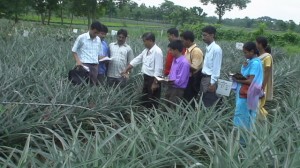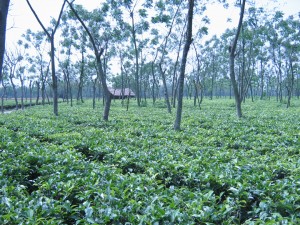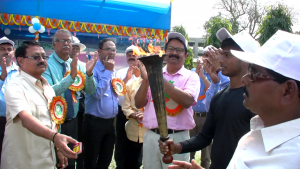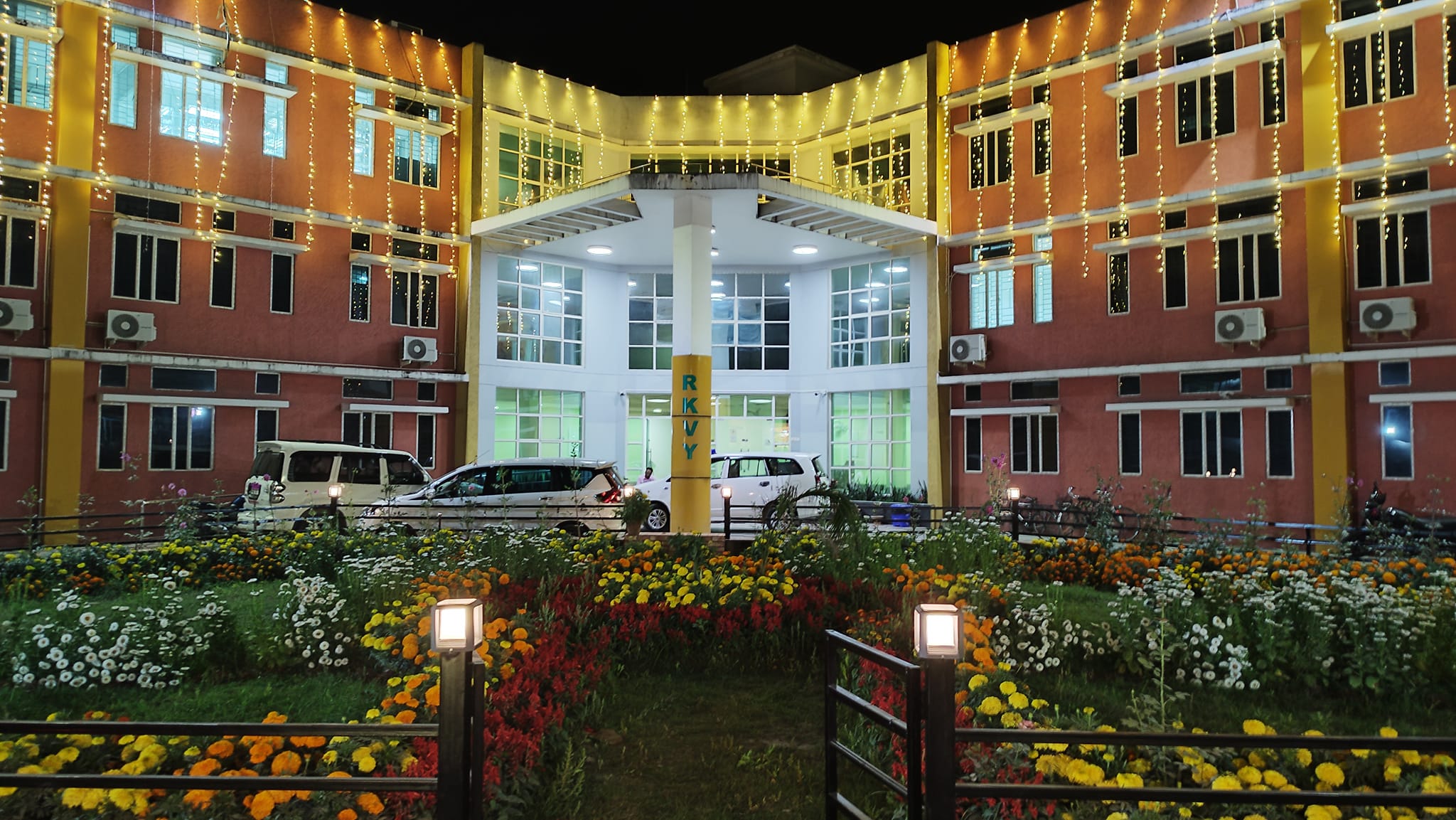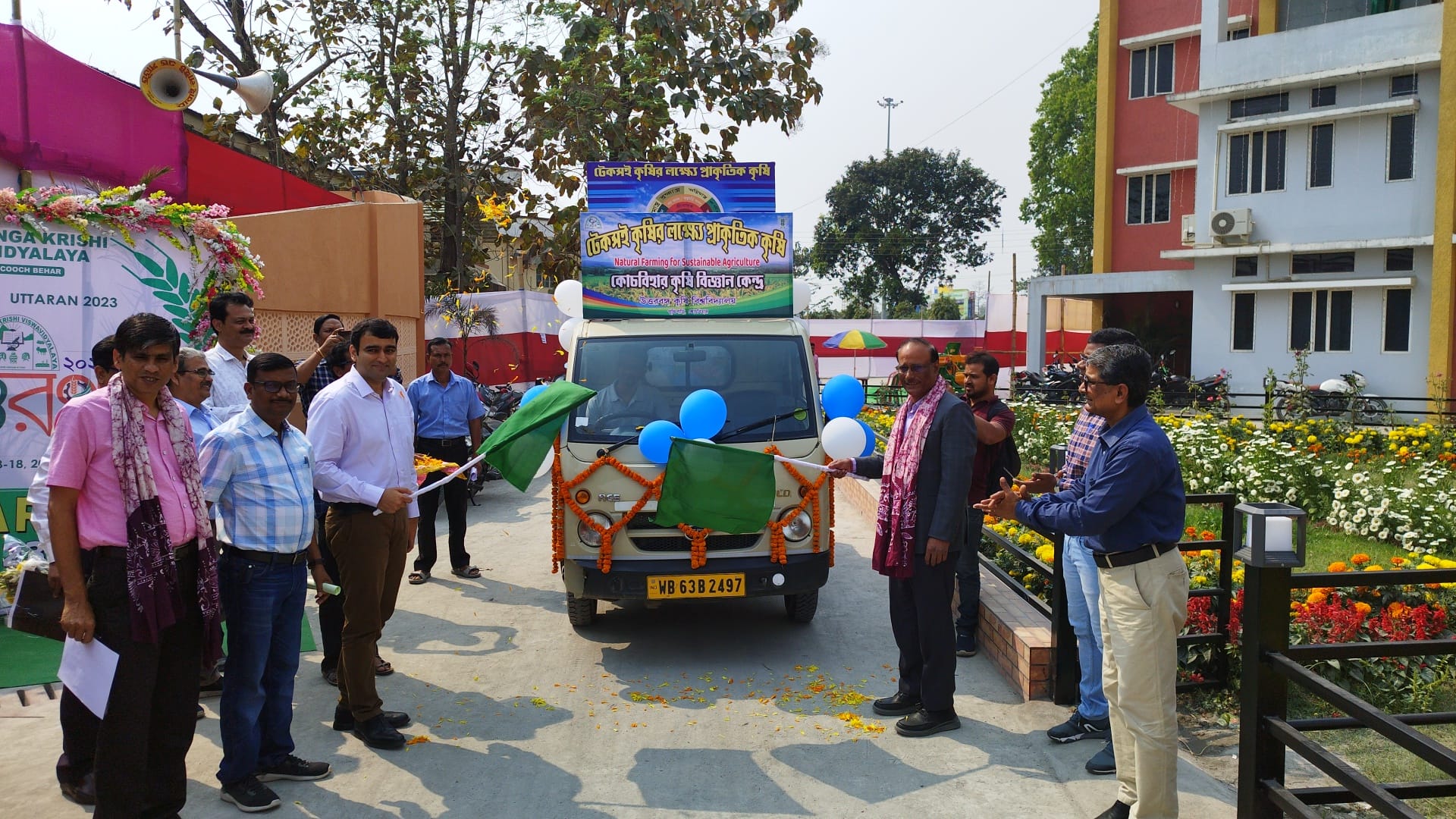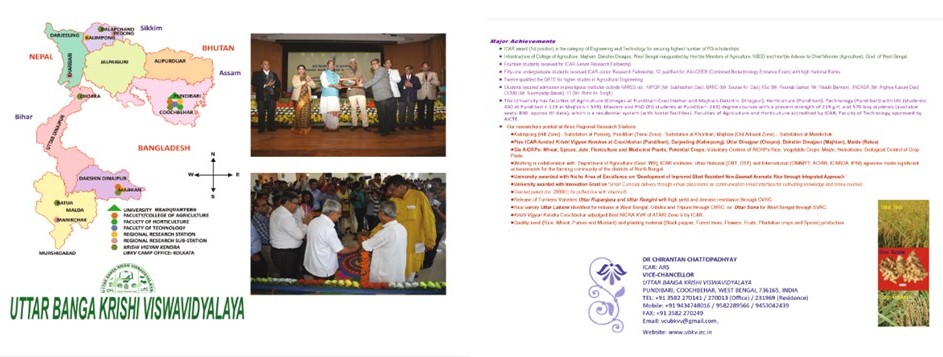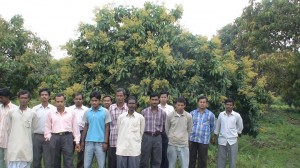[button href=”http://www.ubkv.ac.in/wp-content/uploads/Annual-Report-Faculty-of-Horticulture-UBKV-2016-17.pdf”]Annual Report 2016-17[/button]
[button href=”http://www.ubkv.ac.in/wp-content/uploads/Annual-Report-Faculty-of-Horticulture-UBKV-2017-18.pdf”]Annual Report 2017-18[/button]
FACULTY OF HORTICULTURE

The Faculty of Horticulture was established in the year 1997 vide Government of West Bengal Order No. 8010-Edn/Ag/O/3B(U)-9/96 dated 22nd October, 1997 under erstwhile North Bengal Campus of BCKV and this had been transferred to Uttar BangaKrishiViswavidyalaya on 1st February, 2001 vide West Bengal Act XX of 2000 : The Uttar BangaKrishiViswavidyalaya Act, 2000 in the eye of overall development of Horticulture in respect of teaching, research and extension in its jurisdiction area of eight districts of North Bengal region in particular and the state of West Bengal in general. The Faculty was housed temporarily in a part of Faculty building of Agricultural since inception. However, a part of construction of new building for the Faculty was completed in the year 2010 and the Faculty was transferred to new building.
Mandate of the Faculty:
- Conduction of teaching programmes (Under Graduate, M.Sc., & Ph.D.)
- Conservation, development, management, display and undertake research on native flora. Promotion of use of the flora for horticulture.
- Development of appropriate horticultural based cropping systems for different agro-climatic zones.
- Identification of location specific agro-forestry and silvipasture system for wasteland development.
- Development of improved varieties and hybrids of fruits, vegetables, plantation crops, medicinal and aromatic plants with good quality high production potential, biotic and abiotic resistance and suitable for export.
- Development and field testing of integrated management of nutrients, diseases and pests of important horticultural crops to reduce input costs, environmental pollution and to avoid pesticide-residue problems.
- Post-harvest technology including value-addition and product diversification of important fruits, vegetables, spices, foliage plants, flowers and plantation crops and export promotion.
- Developing rapid tools, bio-techniques and technologies for genetic manipulations for introducing desirable traits of yield, quality and stress tolerance.
- Production of quality planting materials and micro-propagation of important horticultural crops.
- Protected cultivation of vegetables and flowers.
- Development of package of practices for production of organic horticultural produce.
- Transfer of technologies to farmers and entrepreneurs for increase in quality production of horticulture crops.
Name of the Departments (Existing):
- Pomology & Postharvest Technology
- Vegetable and Spice Crops
- Floriculture, Medicinal and Aromatic Plants
- Plantation Crops and Processing
- Forestry
Proposed name of the Departments (as per ICAR-V Deans Committee Report and communicated to the State Govt. on 02.05. 2017):
- Fruit Science
- Vegetable Science
- Floriculture & Landscape Architecture
- Plantation, Spices, Medicinal & Aromatic Crops
- Forestry
- Post-harvest Technology(Newly proposed)
Brief History of the Degree Programmes:
The academic activity was started with 5 students initially in four years B. Sc. (Hort.) Hons. degree programme in North Bengal Campus of BCKV in the year 1997. The students intake has been gradually increased to 10 (ten) after establishment of the University in the year 2001 and fifteen in the year 2005. Now the students strength is 20 (twenty) per year.
Two years’ Master and three years’ Ph.D. degree are being offered by all the departments from 2001-02 academic session except in Floricultural, Medicinal & Aromatic Plants. The Department of Floricultural, Medicinal & Aromatic Plants started Ph. D. programme from 2009-10 academic session and M. Sc. Programme in 2011-12. The main objective was to produce graduates and post graduate students including researchers for enhancing employability, employment potential, entrepreneurship and science–led transformation of our agri-horticulture system.
The Faculty followed recommendations of the ICAR-IV and V Deans’ Committee and BSMA Committee Reportsin time for degree nomenclature and syllabus for UG and PG (M. Sc. and Ph. D.)degree programmes.
List of Academic Programmes:
| Sl. No. | Name of the Department | Bachelor’s
Programme |
Master’s Programme | Ph. D.
Programme |
| 1 | Pomology and Postharvest Technology | B. Sc. (Hort.) Hons. before implementation of ICAR-V Deans’ Committee Report
B. Sc. (Hons.) Horticulture after implementation of ICAR-V Deans’ Committee Report from 2016
All departments of all Faculties at Main Campus of the University are associated with UG course curriculums of the University |
M. Sc. (Hort.) in Pomology and Postharvest Technology | Ph. D. in Pomology and Postharvest Technology |
| M. Sc. (Hort.) Fruit Science
offering from 2017 |
Ph. D. (Hort.) Fruit Science
offering from 2017 |
|||
| M. Sc. (Hort.) Postharvest Technology
offering from 2017 (Newly Proposed) |
Ph. D. (Hort.) Postharvest Technology offering from 2017
(Newly Proposed) |
|||
| 2 | Vegetable and Spice Crops | M. Sc. (Hort.) in Vegetable and Spice Crops | Ph. D. in Vegetable and Spice Crops | |
| M. Sc. (Hort.) Vegetable Science
offering from 2017 |
Ph. D. (Hort.) Vegetable Science offering from 2017 | |||
| 3 | Floriculture, Medicinal and Aromatic Plants | M. Sc. (Hort.) in Floriculture, Medicinal and Aromatic Plants | Ph. D. in Floriculture, Medicinal and Aromatic Plants | |
| M. Sc. (Hort.) Floriculture and Landscape Architecture offering from 2017 | Ph. D. (Hort.) Floriculture and Landscape Architecture
offering from 2017 |
|||
| 4 | Plantation Crops and Processing | M. Sc. (Hort.) in Plantation Crops and Processing | Ph. D. in Plantation Crops and Processing | |
| M. Sc. (Hort.) Plantation, Spice, Medicinal and Aromatic Crops
offering from 2017 |
Ph. D. (Hort.) Plantation, Spice, Medicinal and Aromatic Crops offering from 2017 | |||
| 5 | Forestry | M. Sc. Forestry | Ph. D. Forestry |
The post graduate degrees offered from the Department of Forestry i. e. M. Sc. Forestry and Ph. D. Forestry were accredited by the ICFRE upto 2020.
Programme-wise intake capacity of the Faculty:
| Sl. No. | Programme | Student Intake Capacity | Guided by University
Regulation |
| 1 | B. Sc. (Hons.) Horticulture | 20 | Under Graduate regulation |
| 2 | M. Sc. (Hort.) in five Disciplines | 20 | Post Graduate regulation |
| 3. | Ph. D. (Hort.) in five Disciplines | 20 | Post Graduate regulation |
| 4. | M. Sc.Forestry | 4 | Post Graduate regulation |
| 5. | Ph. D. Forestry | 4 | Post Graduate regulation |
- For U.G Degree Programme, in absence of ICAR quota for any reason, the vacancies are filled up from open quota.
- The UG and PG Regulations mention the procedures of admission, different fees, registration, conduction of classes, selection of Guide, evaluation process, scholarship, award of degree, etc.
Departmental Committees:
- To exercise general control on teaching and other educational programmes and to maintain and promote the standard thereof at departmental level, each academic department has Departmental committee constituted with the teachers of that department/discipline where Head of the Department acts as the Chairman.
- The Departmental committee is directly responsible to the Faculty Council of Faculty of Horticulture for catering of courses of different degree programmes as per respective syllabus and other academic, research and extension related works of the Faculty.
Faculty Council:
- The Faculty Council of the Faculty of Horticulture is responsible for maintaining teaching standards of the faculty as a whole.
- The Faculty council proposes the course of study and curricula for the various programme and related other proposals of the Faculty to the Academic Council of the University as per the University Act.
- At present, the composition of the Faculty Council is as follows-
- Dean, Faculty of Horticulture, UBKV, Pundibari- Chairman
- Dean, Faculty of Agriculture, UBKV, Pundibari- Member
- Dean, Faculty of Technology, UBKV, Pundibari- Member
- Dean, PG Studies, UBKV, Pundibari- Member
- Director of Research, UBKV, Pundibari- Member
- Director of Extension Education, UBKV, Pundibari- Member
- Director of Farms, UBKV, Pundibari- Member
- Dean, Students Welfare, UBKV, Pundibari as Invitee Member
- Jitesh Kumar Hore, Professor, Department of Spices and Plantation Crops, Bidhan Chandra KrishiViswavidyalaya, Mohanpur, Nadia, West Bengal- Vice- Chancellor nominated Member
- L. C. De, Principal Scientist(Horticulture) and In-Charge, Horticulture Section, ICAR-NRC-Orchids, Pekyong, Sikkim- – Vice- Chancellor nominated Member
- Head, Department of Pomology and PostHarvest Technology, F/Hort., UBKV, Pundibari- Member
- Head, Department of Vegetable and Spice Crops, F/Hort., UBKV, Pundibari- Member
- Head, Department of Floriculture, Medicinal and Aromatic Plants, F/Hort., UBKV,Pundibari- Member
- Head, Department of Plantation Crops and Processing, F/Hort., UBKV, Pundibari- Member
- Head, Department of Forestry, F/Hort., UBKV, Pundibari- Member
- N. Bhowmick, Asst. Prof., Department of Pomology and PostHarvest Technology, F/Hort. – Member
- S. Basfore, Assistant Professor, Department of Vegetable and Spice Crops, F/Hort., UBKV- Member
- S. Moitra, Professor, Department of Floriculture, Medicinal and Aromatic Plants, F/Hort- Member.
- H. Bhattacharjee, Professor, Department of Plantation Crops and Processing, F/Hort., UBKV- Member
- SumitChakravorty, Professor, Department of Forestry, F/Hort., UBKV, Pundibari- Member
Anti-Ragging Committee:
- Formation-26/07/2018 vide notification no 611/UBKV/Est (anti.rag-167).
- At present, the composition of the Committee is as follows-
Chairman – Vice-Chancellor, UBKV
Convenor – Dean, Students’ Welfare, UBKV
Member – 1. Officer-In-Charge, Pundibari Thana
- BDO, CoochBehar / Representative of District Magistrate, CoochBehar
- Nominated member from Local Media forwarded by District Information and Cultural officer
- Nominated member from NGO involved in Youth Activities forwarded by 5. District Welfare Officer, Coochbehar
- Dean, Post-Graduate Studies, UBKV
- Dean, Faculty of Agriculture, UBKV
- Dean, Faculty of Horticulture, UBKV
- Dean, Faculty of Technology, UBKV
- Associate Dean, College of Agriculture, Majhian, DakshinDinajpur
- Dr.ParthaSarathiPatra, Assistant Professor, RRS, Terai Zone, UBKV
- Dr.Bimal Das, Assistant Professor, Dept. Of GPB, College of Agriculture, Majhian, DakshinDinajpur
- Dr.NripendraLaskar, Associate Professor, Dept. of Agril. Entomology, F/Ag., UBKV
- Prof. (Mrs.) D. Sarkar, Professor in Fishery, RRS, Terai Zone, UBKV
- Dr.SabitaMondal, Assistant Professor, Department of Agril. Extension, F/Ag., UBKV
- Prof. Prodyut Kumar Paul, Professor, Dept. of PPHT, F/ Hort., UBKV
- Dr.ArpitaMandal Khan, Dept. of FMAP, F/Hort., UBKV
- Er. Ashis Kumar Das, F/Tech., UKV
- Om PrakashChaturvedi, F/Tech., UBKV
- Mrs.ShakilaKhanam, Office of the Registrar, UBKV
- Mr.RayajulHasanSarkar, Office of the Dean, F/Ag., UBKV
- One representative from present students nominated by C.S.U., UBKV
- One representative from fresher student nominated by C.S.U., UBKV
- One Parent Representative nominated by C.S.U., UBKV
Anti-Ragging Squad:
- Formation – 26/07/2018 vide notification no 611/UBKV/Est(anti.rag-167).
- At present, the composition of the Faculty Council is as follows-
- NripendraLaskar, Associate Professor, Dept. of Agril. Entomology, F/Ag., UBKV
- SomnathMandal, Assistant Professor, Dept. of Biochemistry, F/Ag., UBKV
- PuspenduDutta, Assistant Professor, Dept. of SST, Fag., UBKV
- Nazir Ahmad Pala, Assistant Professor, Dept. of Forestry, F/Hort., UBKV
- Hossain Ali Mondal, Assistant Professor, Dept. of GPB, F/Ag., UBKV
- AmarenduMondal, Resident Superintendent cum NSS Coordinator, DSW Office, UBKV
- AditiChakroborty, Assistant Professor, Dept. of PPHT, F/Hort., UBKV
- M. Prema Devi, Assistant Professor, Dept. of PPHT, F/Hort., UBKV
- Lakshmi Hijam, Assistant Professor, Dept. of Genetics and Plant Breeding, F/Ag., UBKV
- Litan Das, Assistant Professor, Dept. of Agril. Extension, F/Ag., UBKV
- HimadriShekharKonar, Assistant Professor, F/Tech., UBKV
Prevention of Sexual Harassment of Women at Work Places:
The University notified the Composition of the Committee for Prevention of Sexual Harassment of Women at Work Places as mentioned hereunder.
| 1. | Prof. (Mrs.) DebapriyaSarkar | Presiding Officer | 9434484014 |
| 2. | Prof. Jagadish Chandra Jana | Member | 9475832372 |
| 3. | Mr. SafiarRahaman, Development Officer | Member | 9474331972 |
| 4. | Mrs. ShefaliGoswami (Bagchi), Counsellor, Family Counselling Centre, Red Cross Bhavan, Hakimpara, Siliguri | Member | 9434494555 |
| 5. | Smt. MadhuchandaSengupta, Senior Stenographer | Member | 9434686464 |
| 6. | Smt. SakilaKhanam, Junior Assistant | Member | 9614657109 |
Monitoring Mechanism for Quality Education in the Faculty:
For UG Programme:
- The university has an online ‘Student Information System’ Module which records the course wise attendance of students uploaded by individual course instructor. Monitoring of regular classes is also done through the module. Student can also log in to the system to keep a tract of their attendance.
- The Deans of the Faculty monitor the theory as well as practical classes on daily basis.
- The university also sends periodic SMS and email to the student having shortfall of attendance i.e., less than 75% separately for theory and practical. In shortfall cases, they are not allowed to appear in the examinations.
- For quality assurance, the examinations are conducted centrally. The examination schedules are prepared and students’ performance are examined and approved by the Board of Examination regularly.
- The poor performing students are counseled for their better results.
For PG Programmes:
- The Dean, Post Graduate Studies with the assistance of the Head of the departments monitor the attendance, progress of theory and practical classes, dissertation works, thesis works, centrally conduction of examinations including thesis evaluation.
- For Master Degree Programme, selection of the Chairman of Advisory Committee is done by the concerned Master Degree student according to their merit among the eligible teachers that is decided in the meeting of Departmental Committee prior to their admission in the first semester of the course curriculum.
- A teacher is allowed to act as Chairman of a maximum of 4 Master’s students at any point of time excluding the student(s) already submitted thesis.
- A teacher is allowed to act as Chairman of a maximum of 6 Doctoral students at any point of time excluding the student(s) already submitted thesis.
- For PG degree Programmes, the Head of the Department will prepare the list of eligible teachers on the basis of seniority cum rotation mentioning their tentative broad area of the dissertation programme in the meeting of the Departmental Committee prior to admission every year.
- The admitted students in order of their merit position in the merit panel of the respective academic session or as notified by the Authority shall opt the Chairman amongst the eligible teachers on the basis of seniority cum rotation.
- The Head of the Department will provide the option forms to the admitted students mentioning the name of eligible teachers opened for option with broad area of the dissertation programme against each teacher in that academic year and the students will give their preference and submit to the Head of the Department.
- The Head of the Department in presence of the members of the Departmental Committee will allot Chairman of Advisory Committee according to the option given by the students and will notify accordingly.
- The Advisory Committee evaluates the progress of student regularly against the Proposed Plan of Work formulated on the basis of the syllabus and send reports and proposals to the Board of Research Studies. Board of Research Studies regularly evaluates the progress of Plan of Works of PG Students.
- The students put their daily attendance to the Head of the Department. The Head and course instructors alert the student having shortfall of attendance i.e., less than 75% separately for theory and practical. In shortfall cases, they are not allowed to appear in the examinations.
- There is a well- defined PG Regulation for conducting PG degree programmes of the University.
- For quality dissertation works, PG theses are evaluated by external examiners.
- Dean, Students’ Welfare monitors the students in residential complex for food and accommodation, sports and yoga, cultural programmes, etc.with the assistance of the NSS Coordinator-cum-Residential Superintendent and other staff.
Student READY(Rural Entrepreneurship Awareness and Development Yojana) Programme:
It has been taken up during VII and VIII semesters of UG Degree Programmew.e.f. Academic Session 2016-2017 and will have the following components.
UG Semester – VII
Student READY- Rural Horticulture Work Experience (RHWE) & Placement in Industries: This program is taken up during the VII semester for a duration of 24 weeks and is allotted 0+20 credit hours. The program includes orientation, village stay, all India study tour, industrial placement program, report writing and final examination.
Courses of UG VII Semester:
| Sl.No. | Course Code | Title of the Course | Credit Hours |
| 1 | SR 401 | STUDENT READY- Placement in Villages | 0+10 |
| 2 | SR 402 | STUDENT READY – Placement in Industries | 0+10 |
| Total | 20 (0+20) |
Programme Schedule of UG VII Semester
| Sl. No. | Programme schedule | Duration |
| 1 | Orientation Programme | 2 weeks |
| 2 | Placement in Villages | 12 weeks |
| 3 | All India Study Tour(if not completed in earlier semesters) | 3 weeks |
| 4 | Placement in Industries | 4 weeks |
| 5 | Report writing & Final Examination | 3 weeks |
| Total | 24 Weeks | |
Placement in Industries:
Students are placed in Agro-and Cottage industries and Commodities Boards for 03 weeks. Industries include Seed/Sapling production, Pesticides-insecticides, Postharvest-processing-value addition, Agri-finance institutions, etc.
Activities and Tasks during Agro-Industrial Attachment Programme
- Acquaintance with industry and staff
- Study of structure, functioning, objective and mandates of the industry
- Study of various processing units and hands-on trainings under supervision of industry staff
- Ethics of industry
- Employment generated by the industry
- Contribution of the industry promoting environment
- Learning business network including outlets of the industry
- Skill development in all crucial tasks of the industry
- Documentation of the activities and task performed by the students
- Performance evaluation, appraisal and ranking of students
UG Semester –VIII
Student READY Experiential learning (Professional Package) is for the duration of 20 weeks and will carry a weightage of 0+20 credit hours. Students can select any two modules from the following under STUDENT READY- Experiential Learning program depending on the facilities available at the Faculty.
Courses of UG VIII Semester:
| Sl.No. | Course Code | Title of the Course (any two) | Credit Hours |
| STUDENT READY: Experiential Learning programme | 20(0+20) | ||
| 1 | SR 451 | Module 1 | 10(0+10) |
| 2 | SR 452 | Module 2 | 10(0+10) |
Experiential Learning Programme Modules:
| Sl.No. | Title of the Course (any two) | Credit Hours |
| STUDENT READY: Experiential Learning programme | 20(0+20) | |
| 1 | Commercial Horticulture | 10(0+10) |
| 2 | Protected Cultivation of High Value Horticulture Crops | 10(0+10) |
| 3. | Mass Multiplication of Plant And Molecules through Tissue Culture | 10(0+10) |
| Total | 20 (0+20) | |
- Implementation status: Implemented in business mode from the year 2018.
- Learning outcome: Skill development for own entrepreneurship has been imparted among student but all the students opted for higher studies.
- Profit sharing mechanism (amount) may be mentioned for each ELP: The Faculty adopted the policy and accordingly arrangements were made following ICAR norms.
Priority areas of research works for PG students:
Emphasis is given mainly on –
- Research mandate of the Department, Faculty and the University
- Farmers’ problem identified through the Directorate of Extension Education and other faculties during Farmers Meet and TOT programmes in the university jurisdiction area.
- Problems identified and communicated by the State Government
- Adoption of advanced technology in the university jurisdiction area.
- Development of new technology for high yield and good quality.
- Minimizing cost of cultivation and profit maximization.
